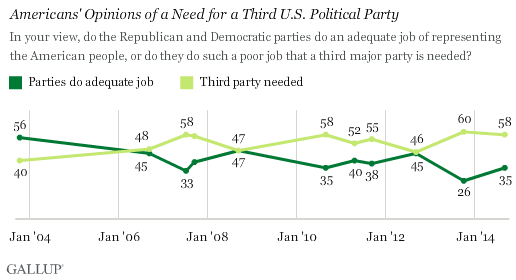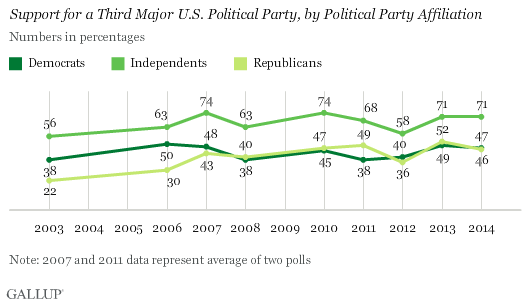A majority of U.S. adults, 58%, say a third U.S. political party is
needed because the Republican and Democratic parties "do such a poor
job" representing the American people. These views are little changed
from last year's high. Since 2007, a majority has typically called for a third party.

first time the question was asked in 2003, a majority of Americans
believed the two major parties were adequately representing the U.S.
public, which is the only time this has been the case. Since 2007, a
majority has said a third party is needed, with two exceptions occurring
in the fall of the 2008 and 2012 presidential election years.
The historical 60% high favoring a third party came in a poll
conducted during the partial federal government shutdown last October.
At that time, 26% of Americans said the parties were doing an adequate
job. That figure is up to 35% now, but with little change in the
percentage calling for a third party.
Americans' current desire for a third party is consistent with their generally negative views of both the Republican and Democratic parties,
with only about four in 10 viewing each positively. Americans' views
toward the two major parties have been tepid for much of the last
decade. However, even when the party's images were more positive in the
past, including majority favorability for the Democrats throughout 2007
and favorability for the GOP approaching 50% in 2011, Americans' still
saw the need for a third party.
Independents Maintain Solid Preference for Third Party
Political independents, as might be expected given a lack of
allegiance to either major party, have shown a far greater preference
for a third political party than those who identify as Republicans or
Democrats. Currently, 71% of independents say a third party is needed,
on the upper end of the trend line. That compares with 47% of Democrats
and 46% of Republicans who say the same.

equally as likely to favor a third party. From 2003 to 2006 -- when
Republicans had control of the presidency and both houses of Congress --
Democrats were more likely than Republicans to see the need for a third
party. And in 2011, after the rise of the Tea Party movement,
Republicans were a bit more inclined than Democrats to see a third party
as necessary.
Implications
Although Americans express a desire for a viable alternative to the
Democratic and Republican parties, third political parties have had
little success in American politics. The U.S. political system makes it
difficult for third parties to hold elected office given the Electoral
College system of electing presidents and election of members of
Congress from individual states and districts based on the candidate
getting the most votes. Such a system generally favors two parties -- a
center-right and a center-left party -- that have the ability to
assemble a winning plurality or majority in districts and states across
the country. Also, some states have restrictive laws on ballot access
that make it difficult for third-party candidates to appear on the
ballot.
Third parties have had success in other countries when they had
strong support in a particular region, or if members of the legislature
were allocated proportionately to the nationwide vote each party
received. This allowed third parties to hold seats with national vote
shares usually well less than 30%.
Given the U.S. political system, those whose ideology puts them to
the left of the Democratic Party or the right of the Republican Party
are better served trying to work within a major political party than
establishing their own party. Supporters of the Tea Party movement
generally took this approach, with some success, by trying to get their
preferred candidates nominated as Republicans in the last few election
cycles. But as with most U.S. third parties historically, the Tea
Party's influence appears to be waning as the movement did not play a
pivotal role in the 2012 Republican presidential nomination and was less
successful in defeating more moderate Republican candidates in the 2014
congressional primaries than in 2010.
Though the desire for a third party exists, it is unclear how many
Americans would actually support a third party if it came to be.
Americans' preference for a third party may reflect their frustration
with the way the Republican and Democratic parties are performing, as
well as the idea that the system ought to be open to new parties,
regardless of whether this is viable in practice.
No comments:
Post a Comment